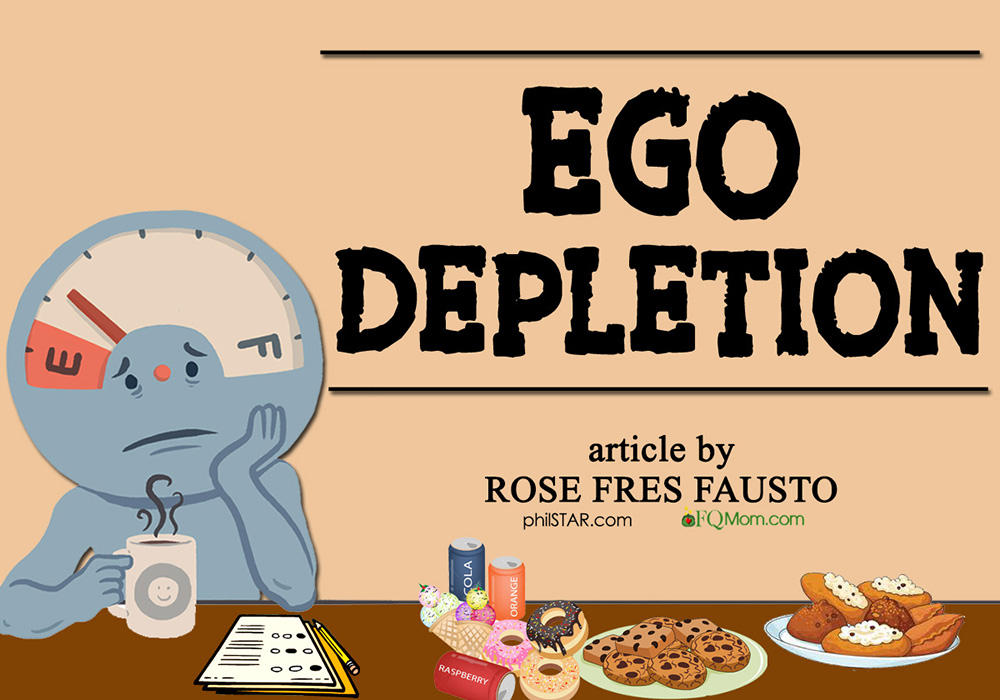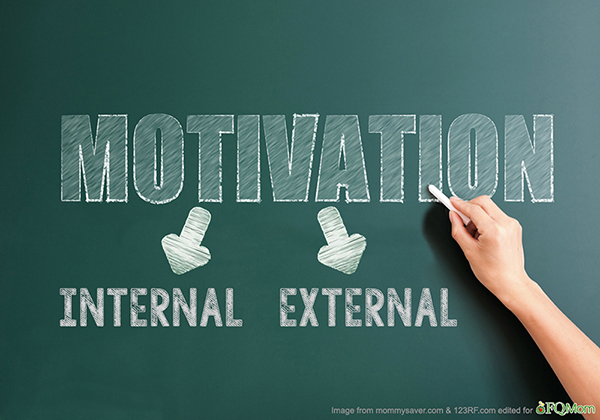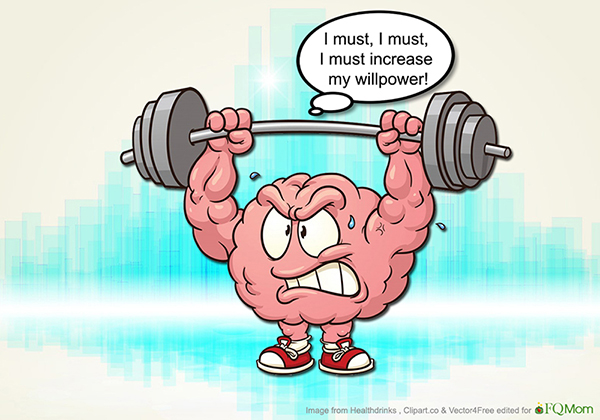Ego depletion


We all aspire to be that disciplined person with tremendous willpower who does the right thing whether someone is looking or not. This ability to resist short-term gratification in pursuit of long-term goals also goes by other names: determination, drive, resolve, self-discipline, self-control and many more. We oftentimes think that it’s a matter of either we are that person or we’re not.
Our topic for today tells us that it’s not a simple matter of being “it” or not at all.
This is what behavioral scientists call ego depletion. “Ego” is used here in the psychological sense, which is the organized and critical part of thinking that balances our physical desires and moralistic aspirations. In other words, it’s our rational thinking, not the colloquial meaning, which we equate with conceit or excessive pride of oneself.
Ego depletion refers to the idea that yes, we all have willpower or self-control but this draws upon a mental resource. As in any resource, this is also limited that can be used up; hence, our ability to make rational decisions is a limited resource that can be drained by decision overload and extreme fatigue.

The cookie experiment
In 1998 psychologist Roy Baumeister, together with wife Diane Tice and other scientists conducted an experiment on self-control with the help of chocolate chip cookies. In the room where the experiment was conducted, cookies were baked giving the place that yummy aroma. They stacked some of the freshly baked cookies on one plate beside a bowl of white and red radishes.

It was earlier explained to the participants that the experiment was on taste perception and that they should not eat at least three hours before the experiment. With the aroma of freshly baked cookies and the two kinds of food in front of him, each participant was asked to eat his assigned food (radish only or cookies only). The experimenter left the participant to eat and went to the adjacent room with a one-way mirror to observe. After partaking in his assigned food, he was asked to do a problem-solving activity, one that’s designed to be unsolvable.
The experimenters recorded the time each participant spent on solving the problem before giving up. There was also a control group, the no-food group. Participants in this group were neither asked to eat anything nor did they smell the freshly baked cookies, but went straight to the problem solving.
Here are the results: the radish condition quits the soonest, an average of eight minutes. The cookie and no-food conditions didn’t differ in their time at 19 minutes.
And so Baumeister et al called this ego depletion. The participants who had to exercise self-control just eating the radish while smelling the aroma and seeing the more appetizing chocolate chip cookies demonstrated the human being’s limited supply of willpower. They used up or depleted their mental energy or ego. This resulted in their giving up on the problem solving a lot sooner compared to the two other groups who did not have to draw on that limited resource prior to the mental activity (see link below to read or download the experiment).
A number of experiments followed suit to prove this theory, using different ways to deplete willpower followed by cognitive exercises and they came up with similar results.
The not so just judicial rulings
Judicial rulings are supposed to be based on laws and facts where judges apply legal reasons in a rational, mechanical and deliberative manner. Unfortunately, it is not so based on the 2011 study by Danziger, Levav, Avnaim-Pesso on the parole decisions of judges. They found out that the likelihood of granting parole is highest after the last meal taken by the judges. From a high of 65 percent after their last meal, favorable rulings drop gradually to almost 0 percent for the last case in a long series before the next break. The favorable decisions abruptly return to 65 percent after the break then goes down to almost 0 percent again, to put it bluntly, as the judges get hungrier and more exhausted.
Not granting a parole is status quo for the prisoner and takes less action from the judges. So we see here that even the judges, who I’m sure, try their best to be as impartial and rational as they can be because their decisions are dramatically life changing, are not spared from ego depletion (see link below to read or download the experiment).

Being conscious of our willpower reserve
Knowing what we know now, we realize the importance of the state of our mind and well-being when making important decisions. We know that it’s not just a simple matter of labeling ourselves as rational and disciplined, or otherwise.
At least we can do away with the excuse of “tao lang po. I’m not like you who’s so disciplined, so put-together…” when we reflect on why we are unable to save and invest, how we allow ourselves to grow from one dress size to another and another, why we fail to meet work and school deadlines, how we get entangled in forbidden relationships, etc.
Using such “tao lang po” or “this is who I am” labels are more of an excuse in the hope that we get ourselves off the hook. Instead of such alibis, we are better off being aware of our current disposition, our ego supply. And because we know that our willpower is a finite resource, we have to watch out for our reserve. What is our state of mind when we go shopping? Forget retail therapy. That’s not the best way to solve a bad mood. What is our willpower reserve level when we make both big and small but regular decisions that will all pile up and ultimately bring us closer to our goals or away from them?
Remedies to ego depletion
So what do we do to combat ego depletion? We can trick it with the right motivation. Some experiments showed that when the participants were given a meaningful reason for the exercise on hand, they persisted longer. Take note that doing things just to please others (external motivation) uses up our willpower reserve more than doing internally motivated activities. So let’s be clear on our motivations when we set our goals. And let’s “own” our goals and dreams!

A quick trick is to restore willpower is to take a sweet drink, maybe a sweet candy. Studies show that subjects who exerted willpower depleted their glucose levels. That’s why taking sweet candy is one of the tips in taking exams. Maybe we can use this same trick the next time we’re faced with an irresistible temptation? ![]()

The next time you’re faced with temptation, pop in your sweet candy!
Here’s another one. Willpower is similar to a muscle that can be worn out. But the good news is, just like our muscle, we can also exercise it in order to strengthen it! The next time you’re faced with a decision to make – e.g. whether to spend your entire bonus now on that nifty gadget, pause, breathe. Then go for that more difficult option but the one that you’ve originally intended to do: invest a big portion of it. Yes, it will hurt just like exercise. And just like exercise, no matter how much you hated doing it, once you’re done with it, you will feel great and proud of yourself! Do it regularly to strengthen the muscle, but have healthy intervals to allow your body to recuperate, to allow your willpower to replenish its supply.

Cheers to managing and strengthening our willpower! ![]()
******************************
ANNOUNCEMENTS
What’s your motivation to become rich? Do you “own” that dream? Where are you now in your FQ journey? Find out by taking the FQ Test right now. Click link to take the test. http://tinyurl.com/FQTest

Rose Fres Fausto is a speaker and author of bestselling books Raising Pinoy Boys and The Retelling of The Richest Man in Babylon (English and Filipino versions). Click this link to read samples – Books of FQ Mom Rose Fres Fausto. She is a behavioral economist, a certified gallup strengths coach and the grand prize winner of the first Sinag Financial Literacy Digital Journalism Awards. Follow her on Facebook and You Tube as FQ Mom, and Twitter & Instagram as theFQMom.
ATTRIBUTIONS: Studies cited in the article are as follows:
Ego Depletion: Is the active self a limited resource?
https://faculty.washington.edu/jdb/345/345%20Articles/Baumeister%20et%20al.%20(1998).pdf
Extraneous factors in Judicial Decisions
http://www.pnas.org/content/108/17/6889.abstract
Images from 123RF.com, 521-Healthdrinks, AZ61678.vo.msecnd.net, Can Stock Photo, Clipart Panda, Clipart.co, Clipartix, Clker, Inkmaggot, mommysavers.com, Pinterest, Pixabay, Sallys Baking Addiction, seasonalveghead.com, Shutterstock, True Story Foods, Vector4Free and WPClipart put together to help deliver the message.



















